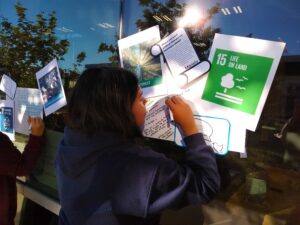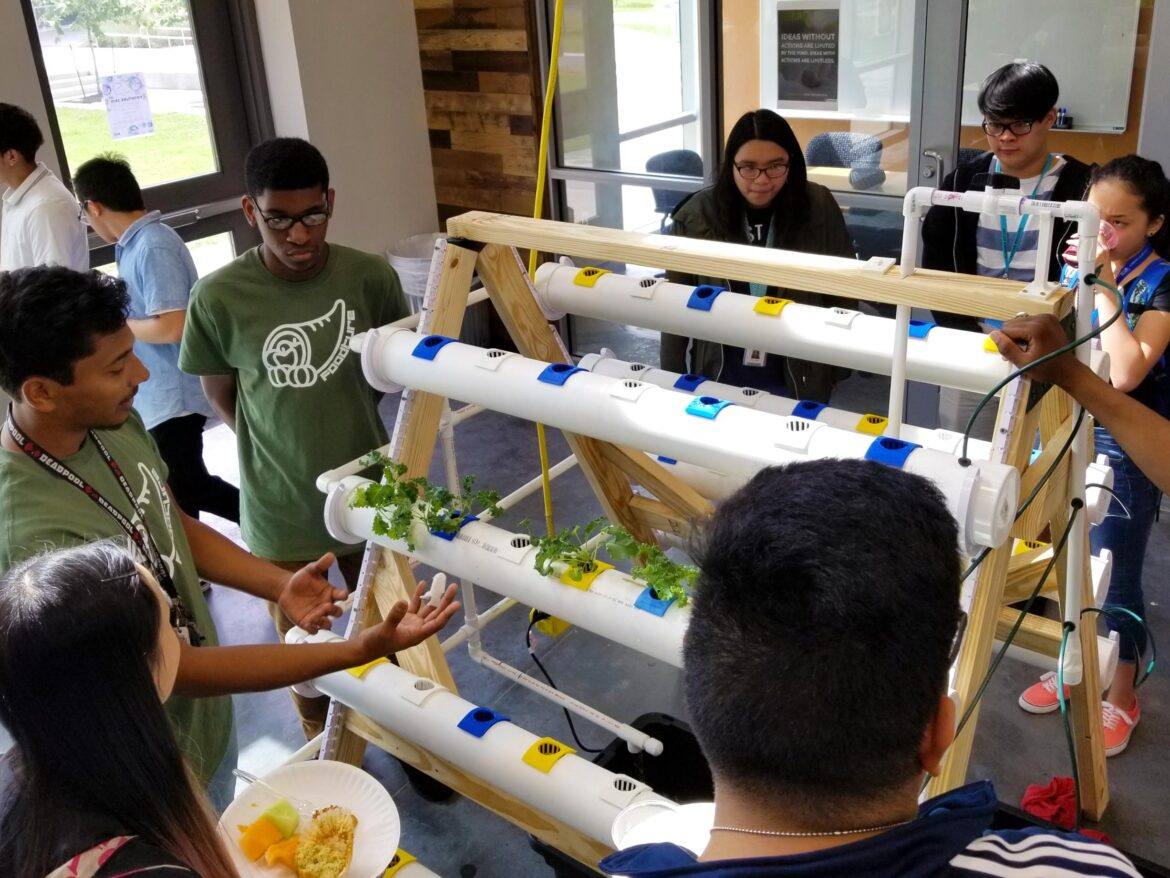As Program Director of IDEAStudio, a forward-looking makerspace at the West Houston Institute, part of Houston Community College, my challenge is to leverage our resources to intersect the emerging disciplines of innovation, design, and entrepreneurship with the traditional disciplines of the arts and sciences to create a robust and active learning environment where students and faculty can tackle problems with real-world relevance.
One of our flagship programs is IDEAS Academy. For the past two years, we’ve partnered with the adjacent Alief Early College High School to work with a cohort of approximately 20 dual-credit seniors to empower them to develop the mindsets and skill sets used by today’s innovators, designers, and entrepreneurs. The goal is to help prepare them to succeed in the rapidly changing global landscape of the 21st century.
We chose EdgeMakers’ “Creativity & Innovation” course to introduce students to the initial concepts and terminology for innovation and to learn how to combine creativity with purpose. This course provides a framework for innovative thinking that we felt could be adjusted over time as the design challenge lifted off the ground.
The Spring Challenge
We teamed up with the Houston Mayor’s Office of Innovation to provide a strong community tie-in. Last spring, participating students were challenged to propose ideas to connect the city’s neighborhoods with fresh and healthy food. Over the course of the semester, program facilitators introduced students to community stakeholders, subject matter experts, and local entrepreneurs to provide mentorship and real-world perspectives during the research process. These brainstorming sessions prompted student teams to develop projects that addressed the four pillars of food security:
- Access — Students’ interviews with local food banks uncovered a disconnect between the hours volunteers typically are assigned to operate the food banks and the availability of those who need the services. As a solution, students developed the concept for Basil Baddies Groceries to connect those in need to local food pantries in ways that promote dignity and convenience through the use of an online platform.
- Availability — Students researched hydroponics and aquaponics and developed a customized A-frame hydroponics system to experiment with natural and convenient ways to manage food production and promote the development of community food sources in urban environments.
- Utilization — Students in this group focused on the preparation and eating of healthy food and developed an initiative entitled “Wakanda Food Do You Like?” in reference to the popular “Black Panther” movie. They organized a smoothie competition as a playful, gamified approach to encourage healthy and nutritious food choices by teenage consumers.
- Sustainability — This group created a website to tell the story of their work with food sustainability, as well as to document all the solutions developed by the IDEAS Academy cohort so their ideas could carry into the future.

All the student teams participated in a culminating event dubbed “The Foodture” last April in IDEAStudio where they unveiled their projects to their peers and the wider Houston Community College student body. Many community members who had participated as speakers and mentors also were in attendance. This led to some lively engagement and provided a valuable learning experience for all involved. Check out the video of students discussing the value of the spring project.
In Pursuit of Sustainable Development
This past fall, the 2018-19 IDEAS Academy cohort built on the knowledge acquired through the initial pilot program and applied it to the United Nations Sustainable Development Goals (SDGs). Leveraging the EdgeMakers curriculum as a framework and springboard for this project, students participated in activities such as “100 Ideas (to Save the World) in 10 minutes” to generate many ideas from which they could choose a few to be developed further over the semester. This approach allowed for a more rapid ideation process and further strengthened their creative skill set. They then split into groups to develop prototypes addressing several of the SDGs, including the following:
- Carbon Capture — Students designed a device that attaches to cars to help reduce car emissions by extracting water and carbon, keeping it from entering the earth’s atmosphere, and allowing for future re-use.
- Wildlife Protection — This group focused on the dangers our human-made environment poses to wildlife. They learned that patterns of bird migrations help determine dangerous obstacles to wildlife. A building on the HCC campus became identified as a window hazard, so students implemented Zen curtain vertical design modifications to prevent birds from flying into the glass.
- Insect Protein — Students learned that many populations in the world use insect protein as a food source. They developed a food truck concept to demonstrate insect-based cuisine to members of campus.
- Dating Culture – Inspired by recently introduced commercial products, students developed their own solution to identify the presence of a “date rape” drug in cocktails with an invention that took the form of a quartz necklace.
Civics Education

This spring, as part of our ongoing partnership with the Houston Mayor’s Office, IDEAS Academy students are partnering on a design challenge with members of local government to create a “bubble up” approach to the 2020 census. Together, they are working with library faculty to conduct research, including the design of surveys, to surface attitudes and beliefs that will help them craft a communication plan to engage their peers in this civic responsibility. By using social media and brand messaging developed by students, local government hopes to engage underrepresented communities to get a complete count of all residents.
Designing a Better Future
We are experiencing a time of productive disruption across the education landscape. Active learning environments are becoming an essential and necessary improvement to the teaching process. Getting students involved in important issues through real-world collaboration is helping them develop solution-oriented thinking while preparing them for future community involvement and success. Flexible curriculum such as that designed by EdgeMakers acts as framework to give direction and purpose to student creativity. The recent success of projects at IDEAStudio in Houston is just the beginning of what appears to be an exciting and bright future for innovation in schools.
Jordan Carswell is Program Director of IDEAStudio, the makerspace at West Houston Institute, an innovation of Houston Community College. Connect with Jordan on Twitter @jordancarswell.

